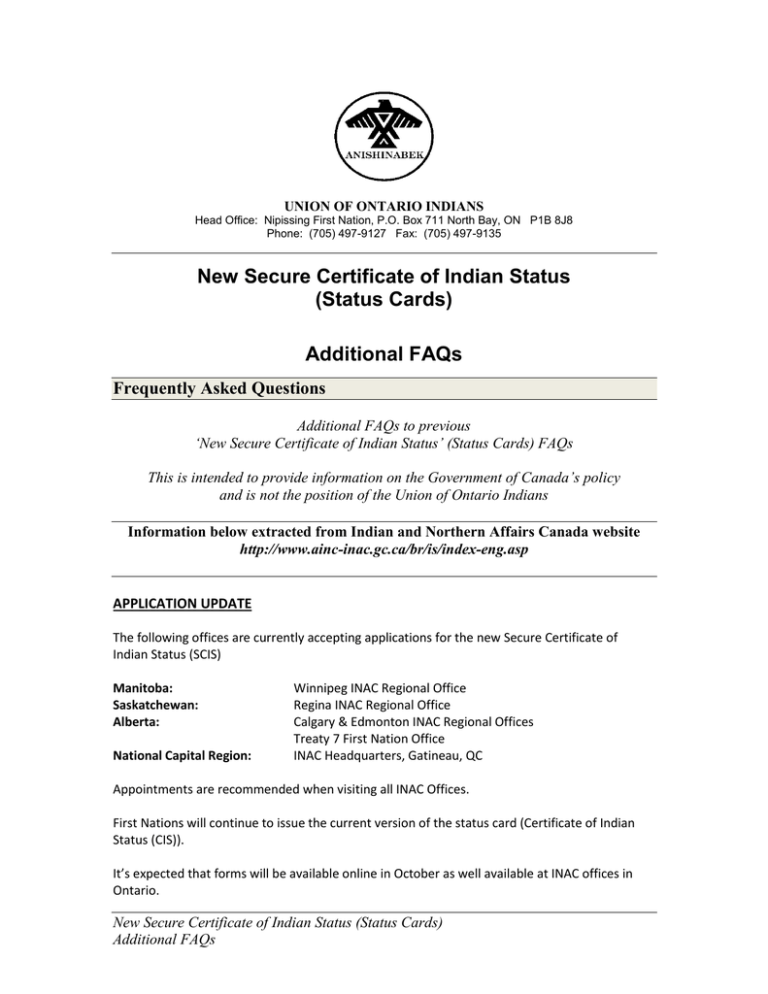New Secure Certificate of Indian Status (Status Cards) Additional
advertisement

UNION OF ONTARIO INDIANS Head Office: Nipissing First Nation, P.O. Box 711 North Bay, ON P1B 8J8 Phone: (705) 497-9127 Fax: (705) 497-9135 New Secure Certificate of Indian Status (Status Cards) Additional FAQs Frequently Asked Questions Additional FAQs to previous ‘New Secure Certificate of Indian Status’ (Status Cards) FAQs This is intended to provide information on the Government of Canada’s policy and is not the position of the Union of Ontario Indians Information below extracted from Indian and Northern Affairs Canada website http://www.ainc-inac.gc.ca/br/is/index-eng.asp APPLICATION UPDATE The following offices are currently accepting applications for the new Secure Certificate of Indian Status (SCIS) Manitoba: Saskatchewan: Alberta: National Capital Region: Winnipeg INAC Regional Office Regina INAC Regional Office Calgary & Edmonton INAC Regional Offices Treaty 7 First Nation Office INAC Headquarters, Gatineau, QC Appointments are recommended when visiting all INAC Offices. First Nations will continue to issue the current version of the status card (Certificate of Indian Status (CIS)). It’s expected that forms will be available online in October as well available at INAC offices in Ontario. New Secure Certificate of Indian Status (Status Cards) Additional FAQs Once I submit a completed application form, how long before I receive my secure status card? Once INAC receives a completed application with all the appropriate documentation the applicant can expect to receive their in-Canada SCIS within 10 weeks, and border-crossing SCIS within 12 weeks. How can I replace my SCIS? An individual may apply for one replacement SCIS per 12 month period for a lost, stolen, damaged or destroyed SCIS. A replacement application made, due to one of these reasons, must include a new completed application form, two new passport style photographs, valid ID, a Statutory Declaration Concerning a Lost, Stolen, Damaged, or Destroyed CIS or SCIS (83-113), and if applicable, the previous SCIS. Additionally, if the Statutory Declaration indicates that the previously issued CIS or SCIS has been stolen, a police claim number is required. Why and how often do status cards need to be renewed? Renewals of current status cards are necessary to comply with international standards (International Civil Aviation Organization) and to meet the requirements of updating the cardholder’s personal information and photograph. In-Canada status cards must be renewed every 10 years; Border-Crossing status cards must be renewed every 5 years. Renewal dates for status cards are automatically linked to the cardholder's date of birth. How is the secure card an improvement? The new SCIS incorporates modern national and international standards for document security. It was designed as a result of a survey, focus group testing and several evaluations led by the Canada Border Services Agency. This secure version of the status card includes specialized graphic design elements and enhanced security features that protect the privacy of the cardholder while minimizing the opportunity for unauthorized alteration, duplication or use. Will service providers and other organizations have access to the information contained in the new SCIS? What will they do with the information? INAC states it has no ability to control how service providers and other organizations will use the information. INAC states that it is up to status card holder to decide if they want to voluntarily allow organizations to have access to the information on their card. New Secure Certificate of Indian Status (Status Cards) Additional FAQs Note: The Machine Readable Zone contains only the information visible on the card. Once a cardholder voluntarily allows a service provider or other organization access to the status card, the information that is visibly present on the card is then available to that business or organization. Is the border-crossing SCIS accepted at United States land and water ports of entry? Yes. On December 21, 2009, the Government of Canada received approval from the United States that the border-crossing format of the SCIS is a Western Hemisphere Travel Initiativecompliant document to enter the United States by land or water. Is the current status card an acceptable document to present when visiting the United States? Yes. The United States Department of Homeland Security (DHS) will continue to accept the current status card as a Western Hemisphere Travel Initiative-compliant document for a reasonable transition period. The interim flexible solution being applied by DHS allows for the use of the current status card to cross the border, by land or water, into the United States. The Government of Canada cautions individuals that the period and extent of this flexibility is entirely at the discretion of U.S officials and reminds travelers that when entering the U.S via air that a valid passport or NEXUS card is required. Will the new SCIS enable First Nations persons born in-Canada to travel to the United States to live or work without obtaining an alien registration card (green card) or work permit? United States Immigration and Naturalization laws require that First Nations persons born inCanada have at least 50 percent Aboriginal blood quantum to enter the United States to live or work without a green card or work permit. As such, United States Immigration and Naturalization usually requests that an individual provide a letter of blood quantum from his or her First Nation or a letter from an INAC office verifying Indian ancestry. Is there a link between the new SCIS and the Jay Treaty? No. The Jay Treaty of 1794 provided free border-crossing rights for “the Indians dwelling on either side of the boundary line” between Upper and Lower Canada and the United States, and exemption from duty or taxes on their “own proper goods” when crossing the border. After the War of 1812, the Treaty of Ghent between Britain and the United States was intended to restore the border-crossing rights of the Jay Treaty, but legislation implementing these rights in Upper and Lower Canada lapsed. Because of this, the Jay Treaty is not recognized in-Canada; thus no link between the new SCIS and the Jay Treaty. New Secure Certificate of Indian Status (Status Cards) Additional FAQs In the 1920s, the United States changed its immigration laws and ever since, Canadian-born people with at least 50 per cent Aboriginal blood can enter, live in and work in the United States without immigration restrictions. BILL C-3 STATUS APPLICANTS Registration of Indian Status and Status Card Process for Bill C-3 Applicants On December 15, 2010 Bill C-3 Gender Equity in Indian Registration Act received Royal Assent and is in effect as of January 31, 2011. Bill C-3 ensures that eligible grandchildren of women who lost status as a result of marrying non-Indian men will become entitled to registration; status. Because of this legislation, approximately 45,000 persons will become newly entitled to status. Bill C-3 applicants are currently being offered an ‘improved service’ whereby eligible applicants can receive registration as an Indian under the Indian Act AND the in-Canada Secure Certificate of Indian Status (status card) in one step. Why is INAC offering Bill C-3 applicants the opportunity to apply for a SCIS before currently registered Status Indians? Bill C-3 applicants currently do not have a status card. INAC states that in its full implementation of the application process for the SCIS, it is more efficient for both clients and INAC to provide the new first-time status Indians the new SCIS at the time of their registration. Both the current status cards and the new SCIS provide equal access to benefits and access to programs. New Secure Certificate of Indian Status (Status Cards) Additional FAQs New Secure Certificate of Indian Status Formats In-Canada Format Confirms individual has ‘registered’ Indian Status, as per Indian Act Provides the identified individual with access to a variety of statutory entitlements and program-based services in Canada Is not an acceptable document when visiting the U.S. via land and water ports-of-entry The only format that will be issued to a cardholder that is born outside the U.S or Canada, regardless of citizenship Issued to cardholders that do not wish to have their personal data shared with Canada Border Services Agency and U.S Customs Border Protection New Secure Certificate of Indian Status (Status Cards) Additional FAQs New Secure Certificate of Indian Status Formats Border-Crossing Format Confirms the individual has registered Indian Status, as per the Indian Act Provides the identified individual with access to a variety of statutory entitlements and program-based services in Canada Is an acceptable document when visiting the U.S. via land and water ports-of-entry Only issued to individuals who are born within Canada or the Unites States, regardless of citizenship Issued to cardholders who give consent to sharing information with Canada Border Services Agency, Passport Canada and only when presented, to the U.S Customs and Border Protection when visiting the U.S by land and water New Secure Certificate of Indian Status (Status Cards) Additional FAQs



